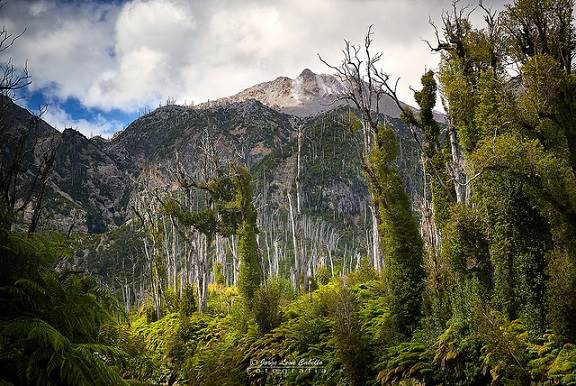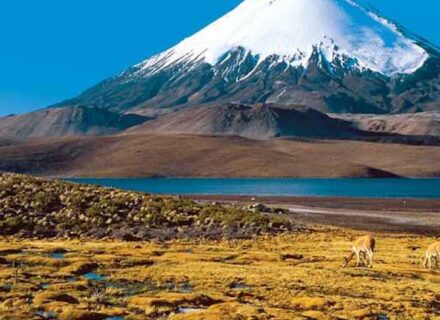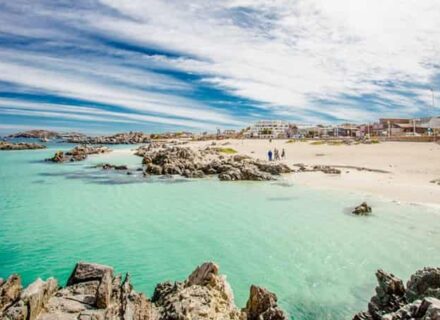The huge extension of the Pumalin park interrupts Chile’s Austral Road and, according to some, leaves the country split in two parts. Once again, the so-called “national interests” clash with environmental concern. American millionaire Douglas Tompkins has, at least, forced our country to think about some serious issues.
At Chile’s 10th Region, right in the middle of the Palena province (between Hornopirén and Chaitén), the Pumalín parks extends throughout 740,000 acres. Its creation was the original idea of American businessman Douglas Tompkins (founder of the Esprit clothes company, among other firms), who was a regular visitor to Chile since the 60s. Through his own environmental foundation, Conservation Land Trust, he began buying land, until forming a property with a unique environmental value. He wants to leave this park as a Nature Sanctuary for generations to come, and keep it protected by Chile’s National Monuments Council.
One can visit Pumalín walking through several paths, one of them surrounded by thousand-year-old alerces, all full of informative signs that teach the historic and biological importance of these surroundings. The main path is the Sendero Tronador, whith takes the visitor for 90 minutes through a large hanging bridge to a sort of natural amphitheater. A specially-settled watch-tower allows one to see several waterfalls, an impressive natural spectacle.

At Caleta Gonzalo, the Park’s neuragical center, one finds camping areas, an information center, a cafeteria and huts that were built according to strict echological standards. Different sea-trips are organized from here to the fjord of Reñihué where you get to see an unforgettable wolf community. Through the Sendero Cascada, one crosses a deep forest for three hours, until reaching a beautiful waterfall in the middle of an impressive landscape. The west part of the park has the thermal baths of Cahuelmó, which can be visited after making a reservation.
The park also has small agricultural land that is ideal for the raising of animals, the production of cheese and honey, the knitting of wool textiles and the care for organic gardens. The spirit is to match conservation with a productive contribution to local economy, integrating the zone’s inhabitants.
Nature’s Sanctuary
To become a Nature’s Sanctuary is one of the five categories established by the National Monuments Council. This condition is given to “those land or sea areas that offer special chances for geology, paleontology, zoology, botanic or ecology studies and investigations; or that may posses natural spaces whose conservation may be of interest to science or the State”.
The sites that are declared as sanctuaries are taken care of by the National Monuments Council, and its maintenance may be either the responsability of private actors or the City. The National Monuments Law establishes that no building nor excavation work can be done in these terrains, nor develop activities such as fishing, hunting, rural exploitation or anything that may alter its natural condition, without the Council’s authorization.
The agreement between Douglas Tompkins and Chile’s government to make Pumalin a Nature’s Sanctuary has been delayed since Eduardo Frei’s administration (1994-1998). There are still a lot of unresolved issues, such as where to build the road that will unite Puerto Montt and Chaitén. Endless discussion has surrounded this now polemic decission. Some fear that this “special protection” will block the State’s free-use of these resources (especially the energetic). Others go even further: through this park, the U.S. may be progressively entering Chile until having a complete control over the Patagonia, and therefore, presenting a huge threat to national security. Supporters praise Tompkins for being able to form in our own country one of the world’s most valuable and large ecology parks, promoting sustainable development and the improvement of life’s quality for all of Palena province inhabitants.
Some, such as senator Antonio Horvath, though not a full suporter of Tompkins admits that such an initiative protects the land even better than State parks. “Half of Chile’s South is already a national park or reserve, so it is State-protected. But a lot of them are protected only in theory, because they have no guards, no paths, nothing. So the State is not doing its job. A good work on this field can be completely profitable. Torres del Paine National Park gets over 120,000 tourists each year, leaving around US$150 million, which is great for the country”.
Take the Argentinian side
Tompkins’ proposal of building a coastal road that would allow to cross the park from the outside has found the support of the Government, but not of Antonio Horvath, the region’s senator: “What I ask for is a continuous path that would guarantee land, electric and communication interconnection”, he says.
“The government must act now, before the park becomes a sanctuary. What I’m asking for is a path that would mean no more than 1,100 acres, from a total of 740,000”. In his opinion, Chileans should not have to cross to Argentina in order to go from Puerto Montt to Chaitén: “If a group of Chileans went to Miami and bought a stripe from the Mexico’s Gulf to the Atlantic, and then ask local citizens to move according to what they say… that’s just not possible”.
Beyond the road issue, Horvath also points out some cultural aspects that are also interesting to discuss. The first one has to do with the productive restrictions that would come with Pumalin becoming a Sanctuary. The senator believes that “one has to relate nature to the human being, the one who shapes culture, identity, and is also part of nature’s patrimony”. This is something that is not contradictory with Tompkins’ ideas, simplified by some as somebody who prefers nature over mankind.
People that know the zone thoroughly speak about the long exploitation that some of this forests have suffered over the years —owners used to cause fires during the 19th Century—, and praise the protection Tompkins is offering. But some doubt: Isn’t it alarming having one person to own such a large territory? “It makes no sense for somebody to own 60 per cent of a City, or 40 per cent of a province”, says senator Horvath, who insists that he is no opponent to Tompkins, “though we have to stop these massive land purchases that will end up exiling people”.
The buying of property to the colonists would, in his opinion, deeply affect the zone’s cultural identity. “What we need to reinforce in this now globalized-world is the concept of the human being as an agend of change. It is he, in his relation with nature, the one to generate culture and identity”. Horvath is one of the supporters of Patagonia becoming part of the Humanity’s Patrimony Unesco’s list.
“What we want is to have a culture of our own. That would allow us to keep Patagonia as a landmark not only natural, but also cultural. We are speaking here about ethnic diversity: about the Chilotes, the Huillliches, the Chonos, the Alacalufes, the Kaweskas, the Yaganes, the Onas”.



